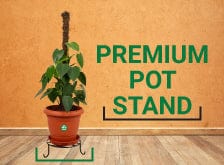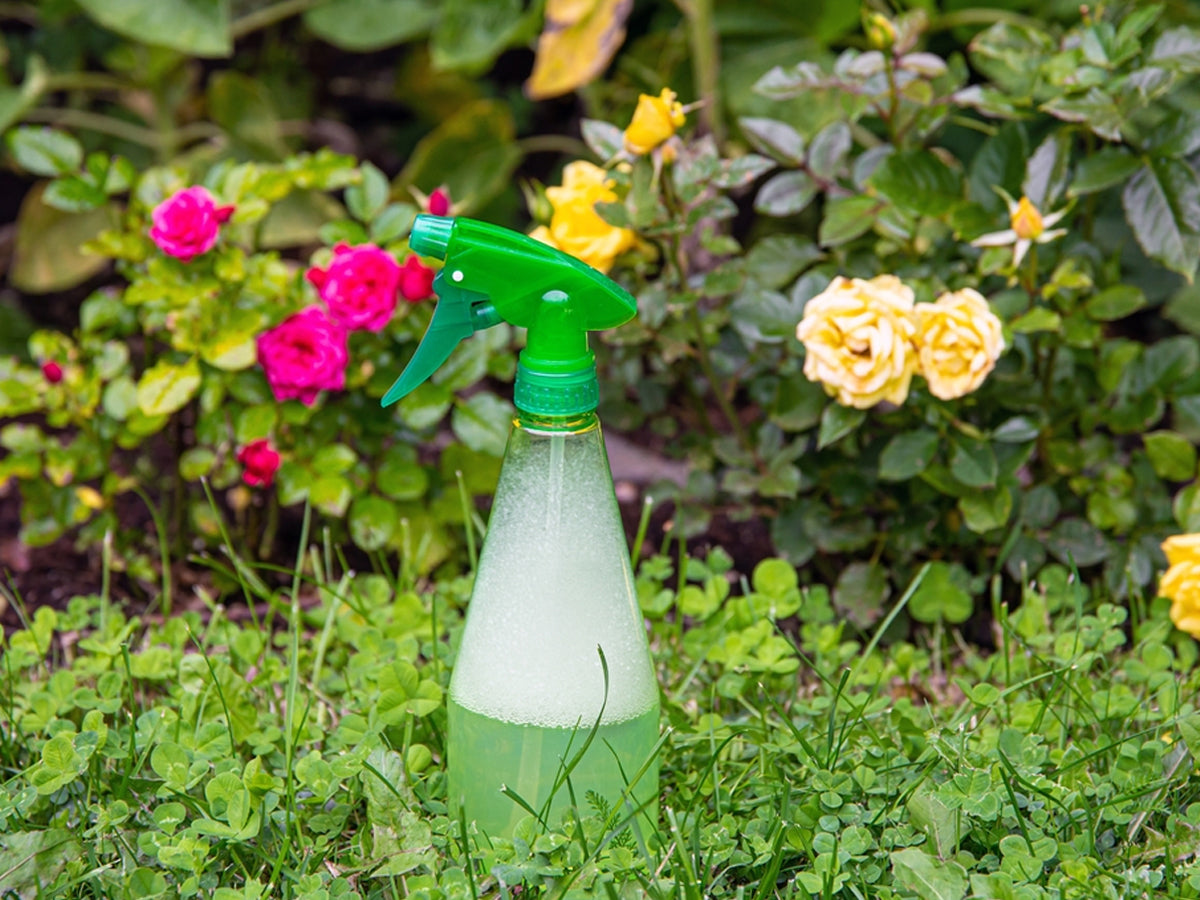How to Grow
Everything You Should Know about Natural or Homemade Pesticides
When there is life, there will be diseases.
All living beings eventually experience certain maladies, but there is a cure for them.
Pests, bugs, and insects cause disturbances to our plants and trees, ruining the flora and occasionally rotting the plants. Pesticides are the easy answer to such instances.
Now, some people oppose using chemical pesticides because they believe they could be harmful to the environment. Additionally, they might leave crops with toxic residue that, if consumed, could be detrimental to people's health.
Therefore, if you have a small home garden that you harvest for your own consumption, natural, organic, or homemade pesticide is a good option for you.
These natural pesticides are highly effective, easy to prepare, affordable, and environment-friendly.
We will discuss these things and many more in this blog. Take a look at what we will talk about ahead: -
- What is a pesticide?
- Why is using pesticides beneficial?
- Homemade pesticides for better home garden
So, let’s explore this highly engaging topic.
What is a Pesticide?
A pesticide is either an organic or a chemical substance used to control, prevent, or eliminate pests such as insects, weeds, fungi, and rodents that can cause harm to plant or animal life.
Pesticides can be in the form of sprays, powders, baits, or other types of formulations. They are commonly used in agriculture to protect crops from pests. Besides that, they are also used in households and public spaces to control pests such as mosquitoes and cockroaches.
Why is Using Pesticides Beneficial?
Read below and know why pesticides are beneficial for your indoor or outdoor garden spaces: -
Conservation of plants or vegetation
The first and foremost benefit that you draw from pesticides is that your crops are protected. Seasonally and depending upon the crop, various pests get attracted to the plants, which may have damaging effects. Pesticides help control and eliminate insects, weeds, and other pests that can damage plants and reduce yields.
Cost-effective
Using pesticides is often more cost-effective than alternative methods of pest control, such as manual removal or natural predators.
Safer food production
The use of organic or homemade pesticides can result in safer food production by reducing the risk of contamination and disease-causing organisms.
Reduce waterborne and insect-transmitted diseases
Pesticides benefit human health by lowering the chance of disease epidemics by reducing rodent and insect populations.
Kind to the environment
By allowing producers to increase crop production per unit area while requiring less tillage, pesticides help prevent deforestation, preserve natural resources, and stop soil erosion.
Conservation of natural resources
By preventing damage to crops, pesticides can help conserve natural resources by reducing the need for additional plantings or inputs.
Overall an easier option
Pesticides can be more efficient than other methods of pest control, as they require less time and labor than manual removal or natural predators.
Homemade Pesticides for Better Home Garden
A homemade pesticide is a solution made from natural or household ingredients that can help control pests in gardens or homes. These types of pesticides are often considered more environment-friendly than synthetic pesticides.
Take a look at some of the pesticides you can easily make at home to keep your garden healthier and happier.
Bugs for Pests Spray
How weird would you feel if we said you could make a homemade pesticide from pests? It sounds interesting and quite unimaginable, but this spray can remove bugs from your garden. Follow these steps to keeps pests away: -
- The process involves gathering enough pests to fill a teaspoon.
- Now, crush them with the back of a spoon.
- Next, place the mashed bugs in cheesecloth and soak them in two cups of water overnight.
- Pour it into a spray bottle and use it within three days for the best results.
Chili Pepper Repellant
Hot pepper plants are worth planting in the yard even if you don't like spicy food because they keep insects away. Make this type of pesticide using the following steps: -
- To create a natural pesticide, grind a handful of dried hot peppers, including the seeds, in a food processor until it turns into a fine powder.
- Just sprinkle this powder around garden plants and that will repel ants and whiteflies.
- For a more effective solution, mix half a cup of ground chili peppers with a quart of fine horticultural oil and spray the mixture on both sides of the flowering foliage.
You may wear a mask and gloves to avoid contact with the eyes or skin while handling because if the chili is too hot, you may have a burning sensation.
Citrus or Lemon Pesticide Spray
Lemon is the most easily available item in your refrigerator – isn’t it? You can use lemons as a pesticide in addition to making lemonade and squeezing them into salads. You will find this citrus spray helpful for killing aphids and other soft-bodied insects. So, make it following these steps: -
- Take the rind of one lemon and grate it.
- Add it to a pint of boiling water that has just been removed from the heat.
- Let the mixture steep overnight and strain it through cheesecloth or a fine sieve.
- Pour the mixture into a spray bottle and apply it to the affected plant's top and bottom leaves, ensuring that it comes into contact with the insects for it to work.
Effective Oil Spray
With only two uncomplicated components - soap and oil - you can concoct an insecticidal spray that is highly effective. This spray operates by encasing and stifling soft-bodied insects, such as mites and aphids. Make it by following these steps: -
- Combine a quarter cup of liquid soap with a cup of vegetable oil and shake it adequately.
- To treat plants, mix four cups of water with one tablespoon of the concentrated liquid.
- To achieve optimal results, reapply the solution once a week.
Also, you can preserve this blend for future use.
Epsom Salt Wash
Epsom salts can be used in two ways for pest control in plants - either by sprinkling them around the plants or by dissolving them in water to create a spray. Here’s how to prepare it: -
- When making a spray, dissolve one cup of Epsom salts in five gallons of water.
- Pour the solution into a spray bottle and apply it to the affected plants.
- Alternatively, you can sprinkle the Epsom salts around the base of the plants weekly to deter pests and also provide magnesium to the soil, which helps in the absorption of nutrients by the plants.
Garlic Spray
With its natural antibacterial, antiviral, and anti-fungal properties, garlic is also an effective pesticide. To make a garlic-based pesticide, follow these steps: -
- Peel and crush five garlic bulbs, and mix them with 470 ml of water.
- Allow the mixture to infuse overnight, then add a small amount of dish soap and strain it through a fine strainer.
- Dilute the resulting liquid in a gallon of water and transfer it to a spray bottle.
You can use this solution once or twice a week to control various types of insect pests on your plants.
Neem Oil Spray
Neem oil, a natural pesticide for plants, is effective in reducing various pests that disturb plant life. To make this efficient spray, you need to get neem oil from any garden store or food store. The following steps would help: -
- Combine one teaspoon of neem oil with 2 teaspoons of liquid soap and one liter of water.
- Pour this mix into a spray bottle and apply it to the impacted plant leaves.
- Additionally, neem oil can be applied as a preventive measure by spraying the foliage of plants, which are frequently attacked by pests, before they become infested.
Soap Spray
You can create an efficient homemade garden spray to combat aphids, caterpillars, and mites using soap. Here are the steps: -
- Combine one quart of water with three drops of gentle dishwashing liquid
- Add a tablespoon of cooking oil, as that will help the solution stick to the leaves.
- To avoid scorching the plants, mist them with water until they are completely submerged, but avoid using them on blossoms or when the temperature is above 26 degrees Celsius.
Tomato Leaves Pesticide
Solanine and tomatine, present in tomato leaves, possess pesticide and insecticide properties. To create a homemade pesticide from tomato leaves, follow the steps below: -
- Chop some tomato leaves and steep two cups of those leaves in one quart of water overnight.
- Strain the mixture, and then apply the resulting liquid by spraying it on plants.
This insecticide effectively eradicates aphids and several other types of insects that chew on plants, but it also attracts beneficial insects. However, don’t use this spray on nightshade plants such as eggplants, peppers, and potatoes, as it may spread diseases among them.
Having plants or trees in your home garden can add vibrancy to your surroundings. These plants provide fruits, flowers, and vegetables, and it's important to tend to their needs. Resorting to chemical pesticides can be detrimental, which is common knowledge. The simple solution is to concoct homemade pesticides to maintain the health of your green buddies.
We hope this blog will help you to some extent. Happy gardening!
FAQs Related to Homemade Pesticides
What are homemade pesticides?
Homemade pesticides are natural or organic solutions that are made at home to protect plants from pests and diseases.
What are some common ingredients in homemade pesticides?
Neem oil, soap, vinegar, baking soda, garlic, chilies, and neem oil are typical components of homemade pesticides.
Are homemade pesticides safe to use?
Homemade pesticides can be safe to use if prepared and used properly. However, it's important to do your research and follow instructions carefully.
Are homemade pesticides effective?
Homemade pesticides can be effective against some pests, but their efficacy may vary depending on the type of pest and the severity of the infestation.
Can I use homemade pesticides on edible plants?
Yes, you can use homemade pesticides on edible plants. But it's important to use ingredients that are safe for consumption.
How often should I apply organic pesticides?
The intensity of the infestation and the pesticide's efficacy determine how frequently to apply. It's important to follow instructions carefully and not overuse the pesticide.
How long do homemade pesticides last?
The shelf life of homemade pesticides depends on the ingredients used and how they are stored. Some may last for several weeks, while others may need to be prepared fresh each time.
How different is homemade pesticide from chemical pesticide?
Homemade pesticides and chemical pesticides are different in several ways. Homemade pesticides are typically made from natural or organic ingredients, while chemical pesticides are manufactured using synthetic chemicals. Homemade pesticides may be less potent and have a shorter shelf life compared to chemical pesticides. Additionally, chemical pesticides may have a higher risk of harming beneficial insects and may be more harmful to human health and the environment.





